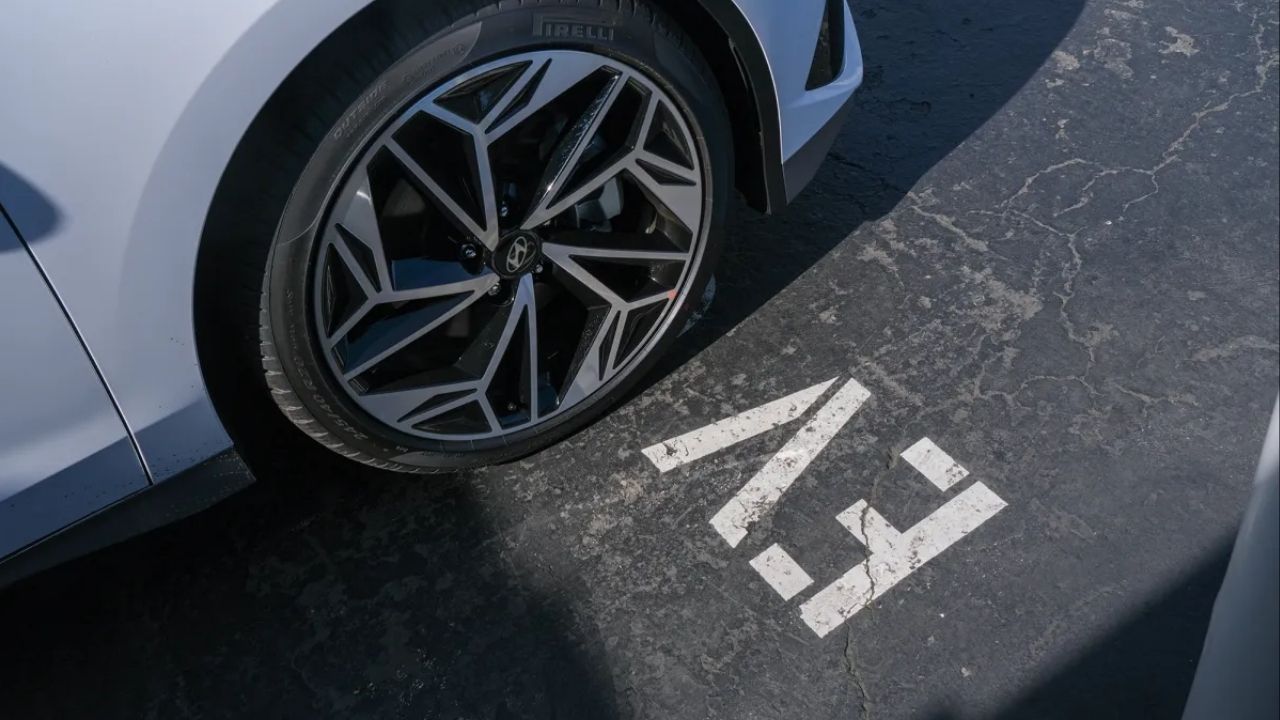A Hyundai Ioniq 6 at an Electrify America charging station in Oakland on Feb. 27, 2024. (CalMatters/Camille Cohen)

- The state has the highest gas tax in the U.S. and some of the worst road conditions, despite generating over $5 billion annually for maintenance.
- Gov. Newsom blames oil companies, while refiners cite regulations and costs. Republicans propose tax cuts, but Democrats have blocked such measures.
- With a 2035 ban on gas-powered car sales, officials are considering alternatives like mileage fees or tolls to replace declining gas tax revenue.
Share
|
Getting your Trinity Audio player ready...
|

By Dan Walters
CalMatters
When California motorists fill their tanks, they are often paying the nation’s highest gas prices, an average of $4.65 a gallon currently and about $1.50 above the national average.
One component of California’s high gas prices is the state’s gas tax, which ranges between 60 and 70 cents a gallon and is also the nation’s highest. The 10-cent range reflects differences on how indirect levies for climate change policies are calculated.
Eight years ago, the Legislature and then-Gov. Jerry Brown enacted a big increase in gas taxes and license fees that raises more than $5 billion a year for rehabilitation and maintenance. However, Californians drive nearly a billion miles a day, and conditions of the state’s more than 400,000 lane-miles of highways, streets and roads remain among the nation’s worst — 49th among the states, according to a recent study by a libertarian think tank.
The interplay of gas prices, gas taxes and roadway conditions is a perennial political football.
Gov. Gavin Newsom periodically blames greedy oil companies for high prices while refiners cite the state’s unique smog-fighting fuel recipes, a tangled regulatory climate and California’s overall high costs of doing business. Republicans accuse Newsom of grandstanding and have proposed to reduce taxes as a way of easing prices, to no avail. The 2017 tax and fee package survived a GOP-backed effort to repeal it via a ballot measure the following year.
Last month, the Legislature’s majority Democrats blocked a Republican-sponsored bill that would have halted expansion of the low carbon fuel program that, they said, would raise gas prices by as much as 65 cents a gallon.
So, in a nutshell, that’s the state of the political infighting over gas prices, but what of the future?
Read More: Race to Zero: California’s bumpy road to electrify cars and trucks
State Wants to Ban Gas-Powered Car Sales
The state wants to ban the sale of gas-powered cars by 2035 as a major step toward converting the 30-plus million vehicles on the state’s roads to electricity or hydrogen power, thereby eliminating the largest single source of emissions affecting climate while erasing gas purchases and gallonage-based tax revenues.
A few days after the Assembly blocked the GOP effort to freeze the low carbon fuel program, the Legislature’s two transportation committees delved into the effects of reduced gas purchases and gas tax revenues.
Tanisha Taylor, executive director of the state Transportation Commission, told legislators that maintaining the system — including certain transit services — would cost $758 billion over the next 10 years, but the state can count on only $541 billion in revenues, given the decline in gas sales.
The committee is exploring, not for the first time, whether the gas tax should be replaced by some other form of taxation that would require zero-emission car owners, who now pay only a small fee, to shoulder their share of roadway costs.
“It is a problem,” said Lori Wilson, a Suisun City Democrat who chairs the Assembly Transportation Committee. “And while the gas tax has been a critical funding source for transportation improvements, it is becoming less effective as a user-based revenue mechanism. We need to explore new solutions that ensure transportation funding is fair and sustainable.”
What Might Those Alternatives Be?
A mileage fee is one being kicked around in political and academic circles, but administering it would require some way of monitoring when cars are being used, which raises privacy issues. Another alternative might be tolls that are common in some states and California imposes on some bridges, but the state has generally been toll-averse.
Whatever it might be, the politics of implementing some new revenue source will be as thorny as the gas tax has been for the last 102 years. Californians are very sensitive about things that affect their time behind the wheel.
This article was originally published on CalMatters and was republished under the Creative Commons Attribution-NonCommercial-NoDerivatives license.



















